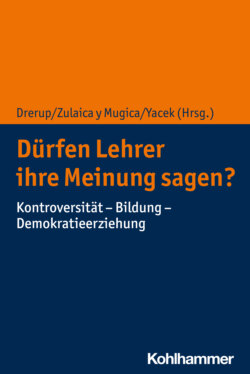Читать книгу Dürfen Lehrer ihre Meinung sagen? - Группа авторов - Страница 15
Literatur
ОглавлениеChristman, J. (2009): The Politics of Persons. Individual Autonomy and Socio-historical Selves. Cambridge: Cambridge University Press.
Drerup, J. (2018): »Zwei und zwei macht vier.« Über Indoktrination und Erziehung. Diskurs Kindheits- und Jugendforschung, 13 (1), 7–24.
Drerup, J. (2021): Kontroverse Themen im Unterricht. Konstruktiv streiten lernen. Stuttgart: Reclam.
Estlund, D. (2008): Democratic Authority. A Philosophical Framework, Princeton: Princeton University Press.
Giesinger, J. (2021): Kontroversität im Ethikunterricht: Das Kriterium der öffentlichen Rechtfertigbarkeit. In: M. Kim, K. Neef, J. Friedrich & T. Gutmann (Hrsg.), Werte im Ethikunterricht. An den Grenzen der Wertneutralität, Opladen: Barbara Budrich (im Druck).
Gregory, M. R. (2014): The Procedurally Directive Approach to Teaching Controversial Issues. Educational Theory, 64 (6), 624–648.
Gutmann, A. & Thompson, D. (2004): Why Deliberative Democracy? Princeton: Princeton University Press.
Hand, M. (2007). Should We Teach Homosexuality as a Controversial Issue? Theory and Research in Education, 5 (1), 69–86.
Hand, M. (2008): What Should We Teach as Controversial? A Defense of the Epistemic Criterion. Educational Theory, 58 (2), 213–228.
Hand, M. (2018). A Theory of Moral Education. London/New York: Routledge.
Hand, M. (2020): Moral Education in the Community of Inquiry. Journal of Philosophy in Schools, 7 (2), 4-20.
Hess, D. & McAvoy, P. (2015): The Political Classroom: Evidence and Ethics in Democratic Education. New York: Routledge.
Larmore, Ch. (1988): Patterns of Moral Complexity. Cambridge: Cambridge University Press.
Larmore, Ch. (1990): Political Liberalism. Political Theory, 18 (3), 339–360.
McAvoy, P. (2017): Should Teachers Share Their Political Views in the Classroom? In: B. R. Warnick & L. Stone (Hrsg.), Philosophy: Education (S. 373–383). Farmington Hills: Macmillan.
Nussbaum, M. (2011): Perfectionist Liberalism and Political Liberalism. Philosophy and Public Affairs, 39 (1), 3–45.
Peter, F. (2019): Political Legitimacy under Epistemic Constraints: Why Public Reasons Matter. In: J. Knight & M. Schwartzberg (Hrsg.), Political Legitimacy (S. 147–173). New York: New York University Press.
Rawls, J. (1993): Political Liberalism. New York: Columbia University Press.
Tillson, J. (2017): When to Teach for Belief: A Tempered Defense of the Epistemic Criterion. Educational Theory, 67 (2), 173–191.
Warnick, B. R. & Spencer D. (2014): The Controversy over Controversies: A Plea for Flexibility and for »Soft-Directive« Teaching. Educational Theory, 64 (3), 227–244.
